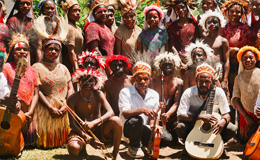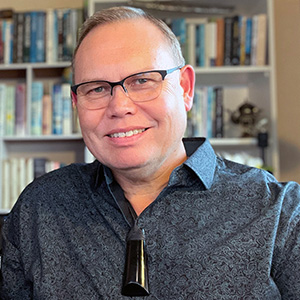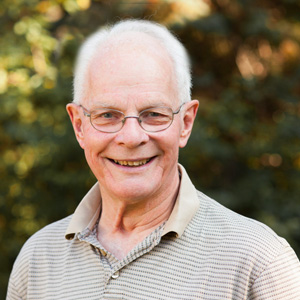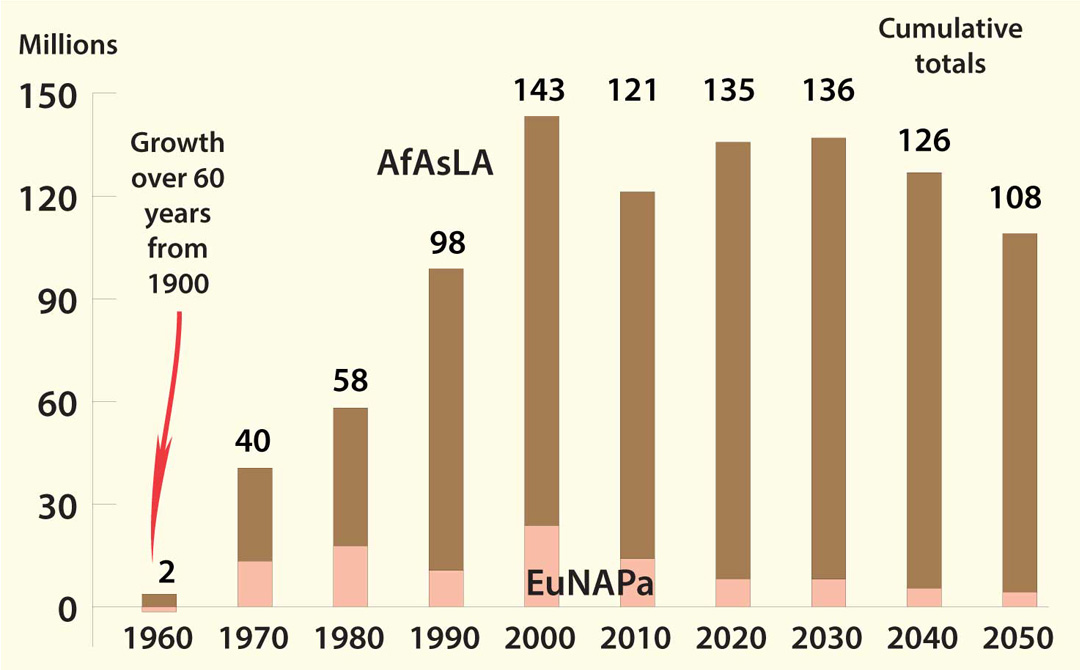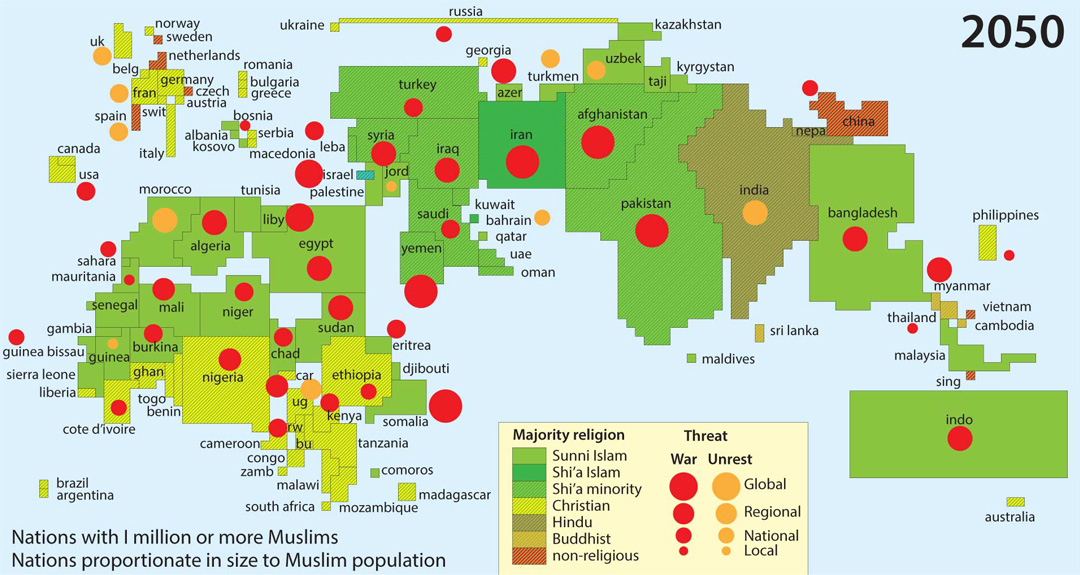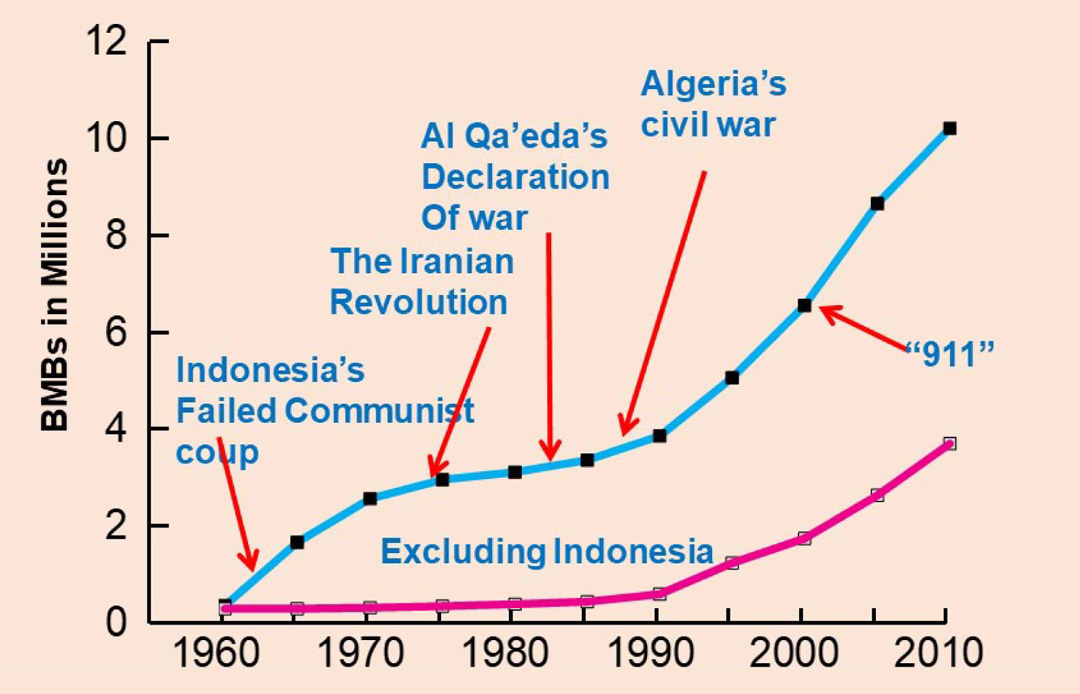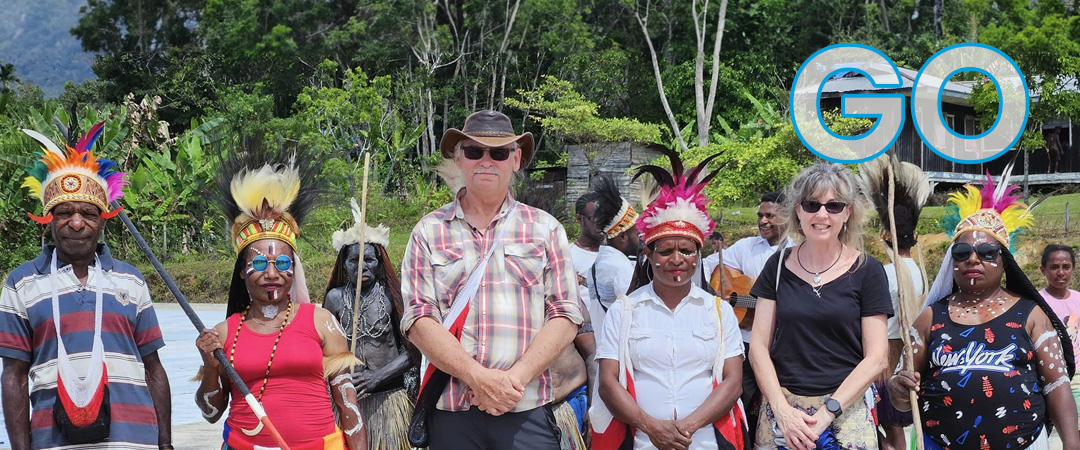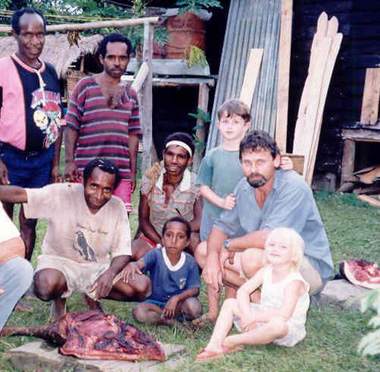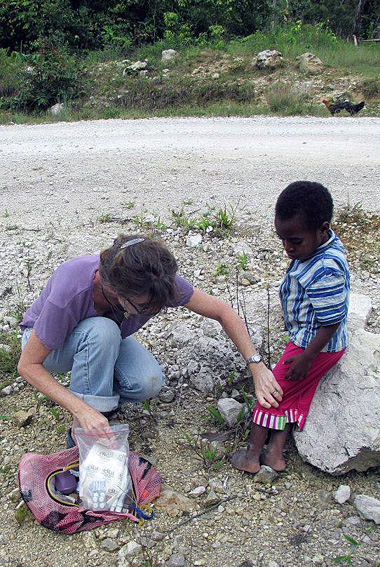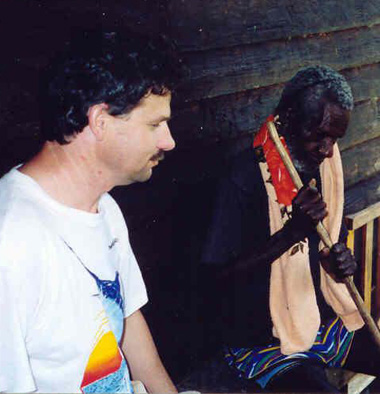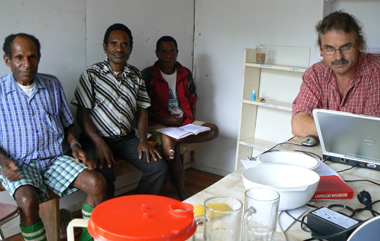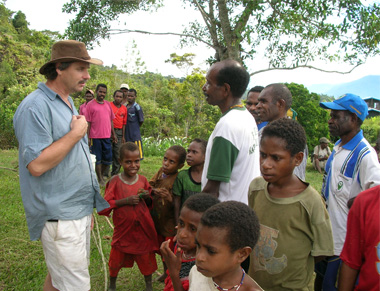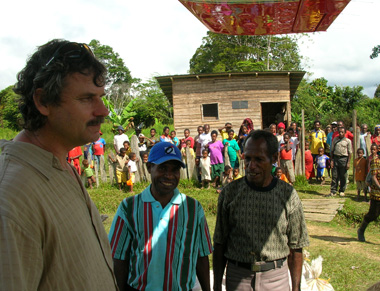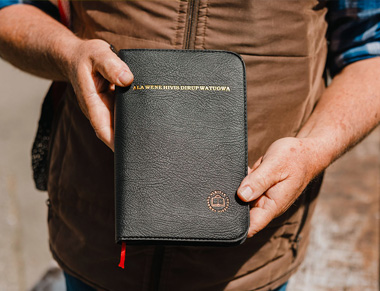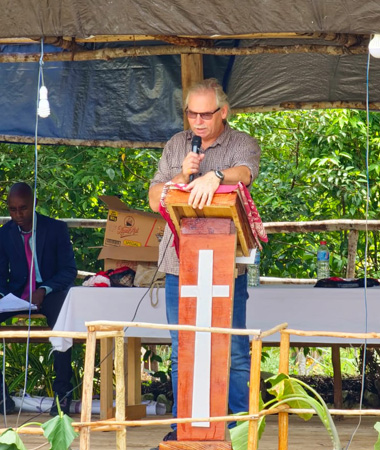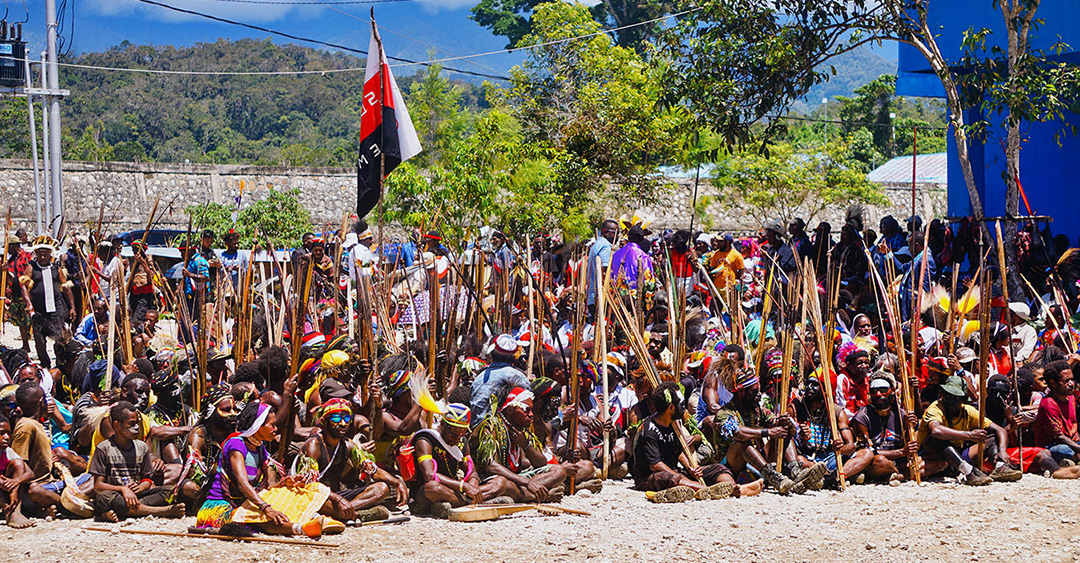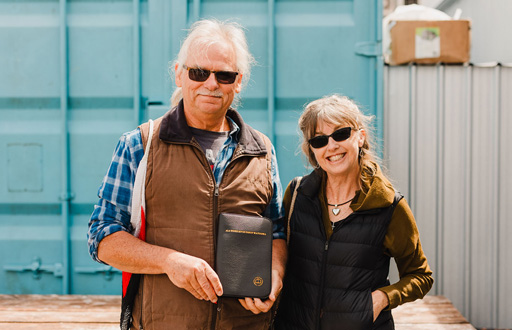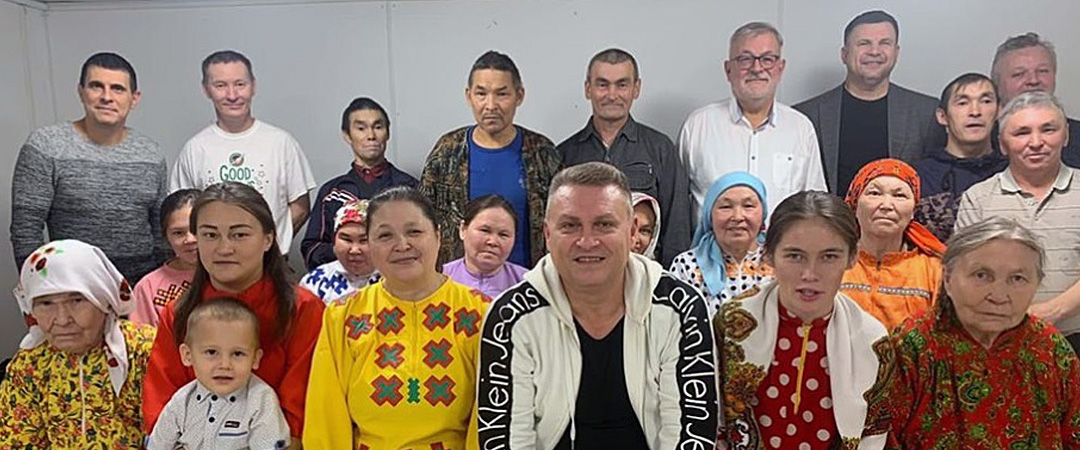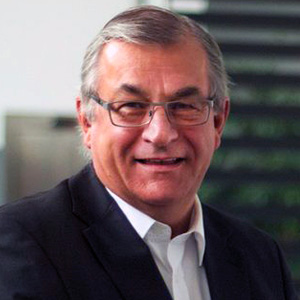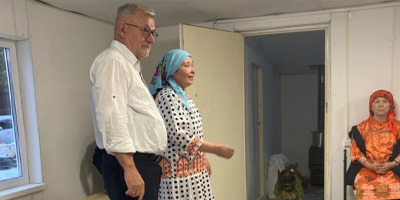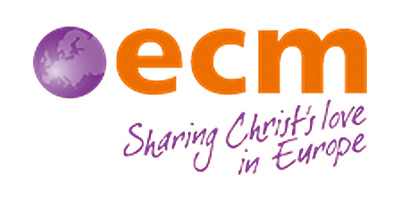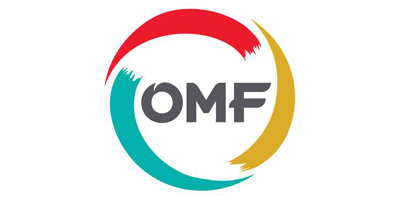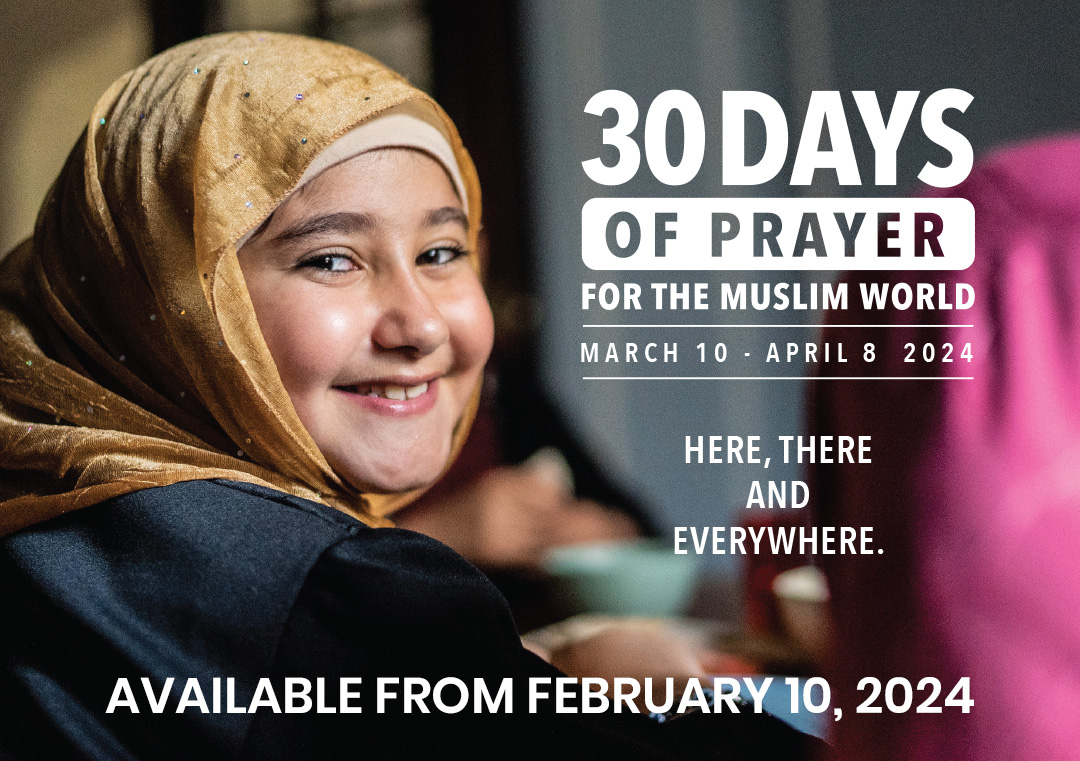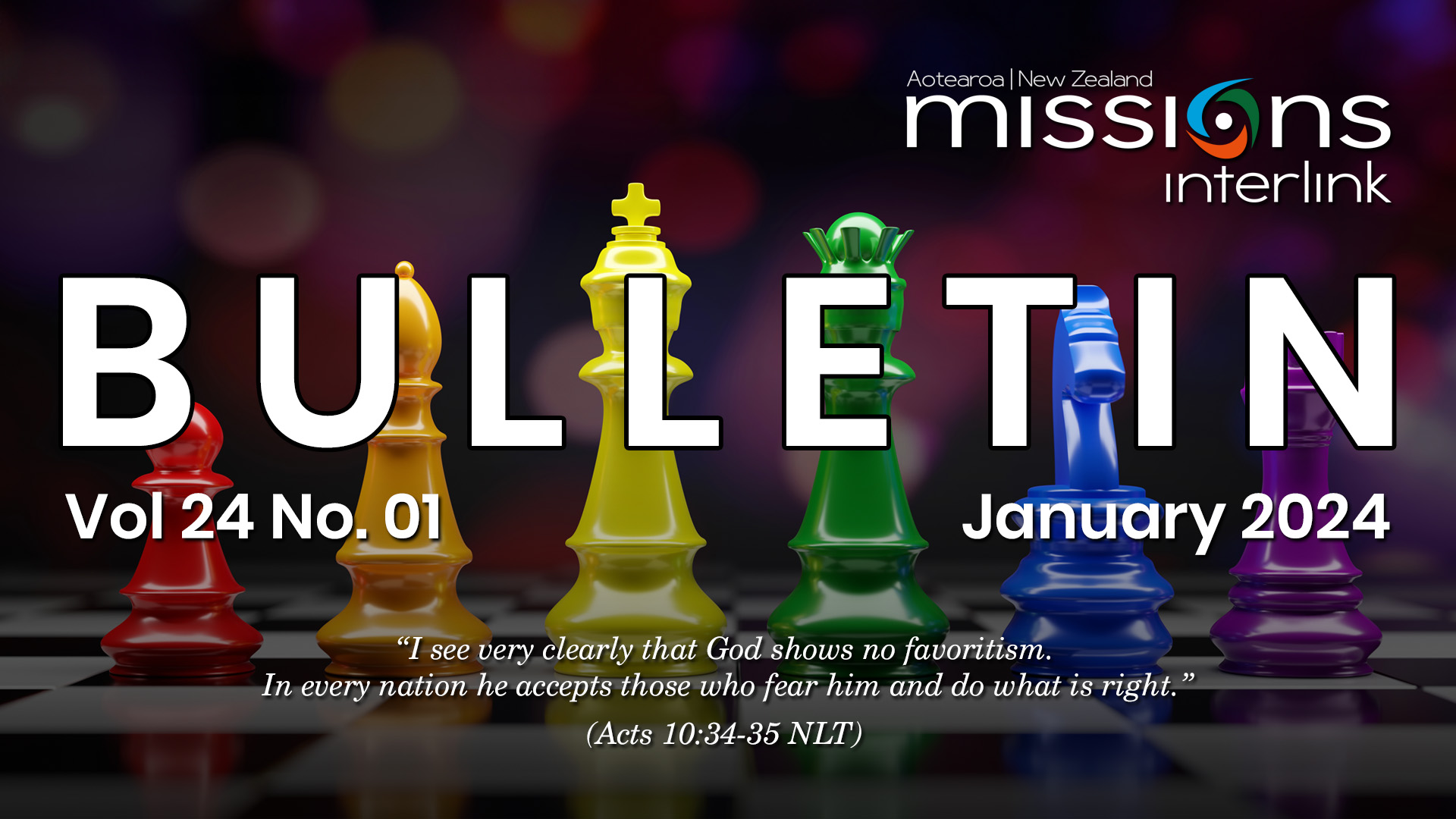
QUICK MENU
EDITORIAL
- Whose Side?
EQUIP
- Global Shifts
GO
- NZ To Nggem
- Christ Among Khanty
CARE
- Unmet Expectations
PRAY
- ECM, MINZ, OMF, WEC.
- 30 Days of Prayer For The Muslim World Coming
SPOTS
- Latest News. Events & Opportunities

EDITORIAL
WHOSE SIDE ARE YOU ON?
By Dr Jay Matenga
Jay is the Executive Officer of Missions Interlink and Executive Director of the World Evangelical Alliance’s Mission Commission. Jay writes and speaks on missions related subjects globally. His blogs, articles, and other public contributions are made available for free on jaymatenga.com
I love the way Peterson’s Message Bible renders the question and response: Joshua asks, “Whose side are you on—ours or our enemies’?” and the response was, “Neither. I’m commander of GOD’s army. I’ve just arrived.” I launched my 2023 Mission Commission Leader’s Missions Forecast from this passage. You can read the full global analysis here: https://weamc.global/leaders-forecast-2023/. Here is a repeat of the introduction as my January editorial…
Presumably because of their idolatry, violence, and otherwise ungodly lifestyles, the people dwelling in the land were deemed unworthy of it and judgement fell upon them by way of the migrating Israelites. We have to concede, however, that the reasons for the conquering of Canaan are known only to the counsel of God. Even so, it is instructive to note that God did not show favour in this. As Peter realised in the house of Cornelius, “I see very clearly that God shows no favouritism. In every nation he accepts those who fear him and do what is right” (Acts 10:34-35 NLT). Rahab was spared, Israel was successful, because they feared God and did what was right.
Approaching Jericho, Joshua was startled by a sword-wielding man suddenly standing in front of him. He asked, “Whose side are you on—ours or our enemies?” (Jos 5:13b MSG). “Whose side are you on?” is a question that is amplifying division in our world today—in ‘the world’, in the Church, and in missions.
We have been living in an ‘either/or’ era for quite some time. As social media became more prevalent in the mid-2010’s it became increasingly possible to bring broad-spectrum shame to bear on people whose behaviour was deemed unacceptable by a large number of like-minded accusers. Around late 2019, but certainly by 2020, this had become known as the “cancel culture” effect. This type of public accountability (and at times, abuse) has become part of a suite of tools used by protagonists to sway public opinion, spotlight unacceptable behaviour, or drive people into certain ideological camps. Before long, ‘cancelling’ was added to a pre-existing toolset of ‘doxxing’, ‘trolling’, and ‘gaslighting’, all relatively new terms IRL (in real life).
It is astounding that some people exist to create conflict on the internet, but the motivation to do so is potent. There is money and power to be gained. Especially by those who can attract and influence a large following or tribe. Q-Anon anyone? People are paid well to create division, to popularise ‘fake news’, sow the illusion of a zero-sum game (where there can be only one winner), and generate sufficient emotion so that their views depersonalise the proposed opposition as ‘the enemy’.
“Whose side are you on?” Joshua asked the man. “Neither” was the answer he got from the Commander of the Lord’s army. Neither. How can that be? Clearly Israel was the Lord’s chosen tool of judgement against Canaan. How could God not be on their side? It is too simple to argue that the moral of the story is that Joshua should have realised Israel was on God’s side. Too many of us act as if we are on God’s side, but the fruit of our actions prove the contrary.
Our actions, Jesus says, show our true selves (cf. Matthew 7:15-20). We need to be both self-aware and discerning. We who lead and those we follow can appear harmless as sheep but are revealed to be vicious wolves by the way people are treated. Are we really the Shepherd’s sheep, exhibiting the fruit of the Spirit in all our relationships, regardless of the context or hierarchy? Or are we, or those who lead us, deceptive, bullying, demanding, mean-spirited, blame-shifting, power-retaining, spiteful, demeaning, self-protective, angry, envious, divisive… or worse? In contrast to the fruit of the Spirit, Paul says that anyone exhibiting attributes like these “will not inherit the Kingdom of God” (Galatians 5:21 NLT). So, why follow such leaders? Why believe them when they try to convince us that a certain group is “the enemy”? Such leaders are not building the Kingdom, their relationship-destroying behaviour is not co-creating Christ’s New Creation.
God has no sides. God only has true followers, those who fear God and do what is right (according to God’s righteousness). The Gospel writers refer to such people as disciples—followers and pupils of Jesus. Beyond Acts, however, the word we translate as “disciple” (μαθητής/mathētēsis) is no longer used. As it grew, the early Church seemed to prefer inclusive familial language (brothers/sisters), or descriptors (believers/saints). Although Matthew 20:18-20 remains prevalent in our missiology, the purposes of God would be better served in our new era if, as we went into all the world, we co-created and instructed family in the name of the Holy Three. ‘Disciple’ can too easily be interpreted through an individualist lens, and ‘make disciples’ as a type of production line. There is no such temptation with family. There is also no division inherent in family. There may be differences, but family is family. Beyond the Gospels, family is a dominant metaphor for Christ’s covenantal community.
If we ask one another “whose side are you on?” the appropriate response should be, “the Lord Jesus Christ’s”. He is not on our side or the side of our particular doctrinal or denominational tribe. If we are truly ‘saints’, our only allegiance is to Him. Every barrier of hostility is broken down between those of us who are one family in-Christ (cf. Ephesians 2:14). Including historic grievances, tribal affiliations, geographic boundaries, state patriotisms, even biblically faithful theological differences. That is not to say that justice is not sought when offense is received, but that we seek redress under a new law, the law of merciful loving-kindness as a people who know that we have received forgiveness in overwhelming measure thanks be to our Lord Jesus Christ, by the great grace of God.
Although the Apostle James was referring to interpersonal conflicts within the fellowship of believers, his encouragement to persevere in the faith equally applies in all situations. As we consider global events and other major changes that have occurred in 2023, we do well to heed his advice (cf. James 1:2-4). The testing of our faith matures us—if we hold fast in our trust in God and commitment to one another in-Christ. This promise of maturity (or completion/perfection/fulness) is cause for great rejoicing according to James.
It sounds perverse to a world hell-bent on avoiding suffering, but this fits with the ‘way of the cross’. Hear me now—I am not suggesting that God is orchestrating global events just for our maturity, but Scripture is clear that the appropriate response to external calamity is steadfast trust in God, finding meaning in the purposes of God, and responding with godly action.
May we all be granted great wisdom and discernment as we move into 2024, contributing our best as we participate in God’s purposes locally and globally. As I am framing my understanding of God’s mission now, may God guide us well as we “collaborate to co-create New Creation”, Together: On Mission.

GLOBAL SHIFTS & MISSIONS
A NEW FACE FOR MINISTRY IN A POST-GLOBALISED WORLD
By Patrick Johnstone
Patrick is a member of WEC International. He is the founding author of Operation World and remains ‘Author Emeritus’. His other books include The Future of the Global Church and The Church is Bigger Than You Think. He and his wife Robyn live in Derby, England. This article is reproduced with permission from the Lausanne Movement’s blog, 31 July 2023.
True globalization could never happen without mastery of the 70 percent of the globe’s surface that is covered by sea, and controlling the sea could only be attained by accurate mapping, achieved by developing sturdy naval ships with navigational tools to measure latitude and longitude. Only then could global empires span continents.
The Chinese attempted this in the early 15th century,[1] and Spain and Portugal created the first of these empires in the 16th century—but the objectives were more for plunder and fame. Then came the trading empires of the Dutch, British, and others. During the latter part of the 18th century, the British navy’s influence expanded across the world, culminating in the defeat of the combined French and Spanish fleet at the Battle of Trafalgar in 1805. Britain then dominated the world’s oceans, imposing a de facto ‘Pax Britannica’ that lasted until 1943.
The British sea captain James Cook’s three voyages of exploration and development of accurate charts laid the basis for the globalization of trade and communications and then fuelled the Industrial Revolution. This, combined with the moral and spiritual impact of the 18th century Evangelical Revival (also called the First Great Awakening), provided the impetus for the ending of the slave trade and paved the way for the modern missions movement to flourish.
The climax of globalization came after the two devastating World Wars and when the US was established as a dominant superpower. The reconstruction period from 1945 onwards, the setting up of a viable networking body with the United Nations, and the newly established set of trade rules undergirded by a huge US naval fleet ensured reasonably safe trade. One could call this a ‘Pax Americana’. Its peak came after the collapse of the USSR Marxist/Russian Empire in 1981.
The pivotal point of the ending of over two centuries of globalization was the ‘9/11’ Islamist terror attack in New York. Since then, we have experienced setbacks that have broken down the structures that sustained globalization. What were these setbacks?
- The Western military and political response to 11 Sept. 2001 and Islamic jihad in Afghanistan, Iraq, Libya, and elsewhere were ultimately disastrous failures. It left Iraq in chaos and Libya in civil war, and left a running sore of insurgency in surrounding Sahel states. It led to Afghanistan reverting to Taliban rule. These failures discouraged the US from continuing to act as the world’s ‘policeman’, soured Westerners to globalization, discredited the whole concept of democracy, and empowered the rise of autocratic and populist leaders. It has also negatively impacted missions and their ministries.
- The ripple effects of Russia’s invasion of Ukraine [and, more recently, the Hamas attack on Israel and Israel’s response] have destabilized the whole world. It has disrupted the availability of many basic commodities such as foods, grains, oil, gas, neon gas, fertilizers, etc. Multiple nations face economic collapse, famines, and violent social upheavals as a result. It has diverted a huge proportion of the world’s wealth away from dealing with poverty, refugees, and climate change.
- The impact of the COVID-19 pandemic has devastated trade, economies, and cultures; accelerated trends toward regionalization; shortened industrial supply chains; hastened population implosions; and changed social and work patterns as well as the way churches operate. The injection of massive funding into the pandemic crisis and world re-armament has led to the enrichment of the often corrupt elite at the expense of straitened middle classes and the further impoverishment of the poor. The increase in indebtedness of most nations is staggering.
- The climate crisis looms over all, with many predicting catastrophic ocean rises, raised temperatures, water wars, famines, massive migrations, and so on.
- The developing population collapse in most parts of the world is paralleled with the fact that the only countries with continued population growth are the ones most affected by the above setbacks, and most are majority Muslim—Pakistan, Egypt, Niger, Mali, etc. The increasing population collapses in Russia, Europe, South Korea, China, etc. could cause social and political structures to collapse in the coming decades. The way churches and agencies operate will need to change if they are to survive.
- The worsening migrant crisis. UN statistics show that the number of those forcibly displaced has steadily increased from 42 million in 2012 to 108 million in June 2023. This does not include all the many economic migrants to cities and to other countries. We can expect this to continue to increase over the coming decades—and must prepare for it. Note the recent graphic of the UNHCR, which shows the increased displacement of populations and the desperate lack of funding.[2]
The Globalization of Christianity
It was Captain Cook’s account of his voyages of exploration that inspired William Carey to write his book, An Enquiry into the Obligations of Christians to Use Means for the Conversion of the Heathens[3]. Carey also gave the first estimate of the world population and its distribution. His book stimulated Protestant churches in the UK and then US and other nations to send out missionaries using the means of prayer and mission agencies. In so doing, he helped put to an end the 300-year neglect of the Great Commission by the Reformers and their successors. Consequently, Christianity spread around the world at an astonishing rate, in every continent and almost every country and the great majority of its peoples too. The greatest ingathering was in the period between 1981 and 2001, when the number of evangelicals increased by over 100 million in the 1990s[4]. The church since then has become truly global, with missionaries going from almost every country to almost every country in the world. Note that the majority of the evangelical growth was in Africa, Asia, and Latin America (AfAsLA) and far less so in Europe, North America, and the Pacific (EuNAPa).
Globalization and the ‘Great Commission’
We need to recognize that the patterns for the ministry of churches and missions that have worked reasonably well for 200 years have largely gone for ever. The Great Commission is just as valid today and we still face an unfinished task that should drive us to our knees. We must still obey that last command of Jesus—but how?
We need to look again at the emphases we find in that Commission and apply these to our changed world. The expression ‘go and make disciples of all nations’ is all-too-often distorted in translation because our grammars do not allow for the Greek verb to be translated as a verb. If we do, it becomes ‘in going, disciple all peoples’. This significantly changes the application of this command!
- The active ministry is ‘to disciple’, but this is the one thing very few churches or leaders focus on. My life aim has been to have disciples that extend to the fourth generation, as in 2 Timothy 2:2, but this took 60 years of ministry to see it realized.
- ‘In going’ implies that the ‘going’ is assumed for all believers. Discipling should be a fundamental component and purpose of every secular and spiritual activity in ministry.
- ‘All nations’ means discipling both individuals and the social fabric of peoples and nations. It is not just the personal extractions of some out of society. Christians should seek to mould others with (and be moulded by) the kingdom values of honesty, integrity, love, and care for the less fortunate, proclaiming an eternal hope.
Ministry in the Breakdowns of Globalization
Here I can only list key areas and say a few words about what I see as major focal points for planning for future ministry:
- The ravages of war. The wars of the 21st century have left many countries devastated and traumatized. Millions have been slaughtered and many more millions displaced, with whole populations impoverished and starving. Think of Algeria, the six former Yugoslavian nations, Iraq, Afghanistan, Libya, the two Sudans, Yemen, Eritrea/Ethiopia, Ukraine/Russia, [and Palestine/Israel] just to name a few. All these will need help for decades to recover. Most of these nations are still largely under-evangelized. Who better to give help than the global network of Christians?
- Migrations. All over the world, the effects of wars, persecutions, and economic stresses have significantly accelerated migration to cities and to other nations. Ministries to migrants will need to be a high priority in Christian ministry with a special emphasis on intentional long-term discipling. Most migrants go to cities if they can, and in their first decade are also more open to receive the Good News. We must not lose that opportunity.
- Economic crises. The breakdown of global supply chains, massive debt levels, and populist nationalisms guarantee serious inflation, multiplied failings, and bankrupt states. A major focus will need to be combining a discipling ministry with door-opening aid projects on limited income that are, as far as possible, self-maintaining and self-propagating. This economic crisis will inevitably mean a lower income and massive rethinking of viable structures and ministries for churches and agencies as giving and membership commitment declines.
- Climate change. There was a brief period in the first 15 years of this millennium where enough of the world’s wealth could have slowed the impact of climate change. Wars, fudging of statistics, greed, and national self-interest make this look unlikely. The effects are likely to further increase the migration of populations from the most exposed areas, especially the African Sahel, Middle East, and Pakistan/Afghanistan. Humankind’s first job description was the stewardship under God of the earth and its inhabitants. It should be in our Christian DNA to care for our world with wise, humane, sensible strategies. It should be part of our missional task to lovingly seek local applications to make for a sustainable future.
- Islam. In 2011 I published this populations map of the Muslim World projected to 2050:[5]
Each country is sized relative to the projected size of its Muslim population and concentrations of the two major branches of Islam: the Sunni and Shi’a. I also indicated which countries would suffer from likely war over the period between 2011 and 2050. It was horrific to realize that scarcely any part of the Muslim world would escape war, mainly between the two branches of Islam and Jihadist movements. Twelve years later, I realize I was too optimistic, so I have somewhat updated the threats. It has been worse with Jihadists bringing war to Mali, Burkina Faso, Niger, and beyond, and also a devastating civil war in Syria.
It is not surprising that the majority of all international refugees are Muslim. This turmoil in the Muslim world has brought disillusionment and despair to many Muslims and a new openness to the gospel, with possibly 20 million new followers of the Lord Jesus in Indonesia, Iran, Algeria, and parts of sub-Saharan Africa[6]. This diagram shows the estimated global population of BMBs in 2010. I reckon there were only about 60,000 BMBs in 1960, but some estimate the number for 2022 to be over 20 million. This unique opportunity is now ours to win many more in our times—both among the many refugees and in their homelands.
- Population collapse. At some stage in the next 40 years, the global population will begin to rapidly decline. I think this will be far more rapid than experts predict because of the issues covered here. For more developed nations this is already a serious reality—especially Europe, Russia, and East Asia, where, in some cases, populations may halve in a generation, with huge impact on economic life and resulting in many countries becoming unviable. This will have a major impact on church life, recruitment to ministry, and giving for Christian work. Our missionary candidates will largely dry up, conversion rates will plummet, churches will become bankrupt, and there will be a growing concern for the elderly. How well are we thinking through the implications in our strategies for world evangelization?
- Peoples and language extinctions. The 20th century involved ministry to a world population that was largely rural, with great cultural and linguistic variety. Our ministry emphasis was on identifying peoples and their languages so that we could disciple them and give them the Scriptures in their own languages. This was the great emphasis of many missions and international bodies such as the Lausanne Movement and the AD2000 and Beyond Movement. This will continue for some decades, but with the unstoppable massive migrations to cities and other lands that will dominate the next 50 years, our focus changes to cities where the great majority of the world population lives in the 21st century. Cities are great melting pots of cultures and language. New cultures and languages will emerge that will need to be discipled. The 17,000 people groups of the world speaking nearly 7,000 languages will converge into 250 people clusters, and these into 15 Affinity Blocs that will become a more significant focus in cities. Some postulate that 2,000 languages will die out by 2100. I suspect it will be nearer double that because of the megacity expansions and the internet. Only 39 languages are used as a teaching medium for multiple subjects in the world’s universities, and Google Translate is available in 133 languages—what an advantage these languages have! How will this affect our investment in ministries, deployment of personnel, and structures? We will adapt or die.
Globalization: What Remains?
The Russian invasion effectively sealed the fate of the one political entity that provided a framework for globalization: the United Nations. The UN’s failure to discipline such an act of aggressive genocide by a Security Council member exposed its impotence. There are, however, two major aspects of globalization I foresee as likely to thrive.
The Internet Empire
We will not see the clock put back to the globally compartmented, regional shape of the pre-Reformation world. We cannot stop the global influence of the internet, whatever barriers autocratic regimes may seek to impose. It is here to stay and is pervading every area of human existence. For many of us, that prospect, once viewed as a great boon and source of information, now looks like a terrifying monster spewing porn, fake news, propaganda, and ideologies that divide and destroy. The development of artificial intelligence could threaten the destinies of individuals and nations. The social media empires have, in effect, become an unaccountable global superpower. The advent of COVID-19 hastened us in this direction with Zoom, etc. How do we need to re-tool our ministries and churches to be more impactful in a frenzy of social media distractions to effectively evangelize the netizens of this cyber world?
The Global Church
The other survivor of de-globalization is the living, globalized church. There is no other global body in existence that could effectively bridge every divide of culture, politics, language and geographical boundary to offer a unifying, alternate, heavenly culture that liberates, unites, embraces accountability, and gives hope for the future.
Latin America, Africa, and Asia not only make up the Majority World, but also now have a significant majority within the global church and are often more biblical and evangelistic than their counterparts in the West. Will we prove to be humble and willing to adapt to a very different world and embrace this component of globalization?
As equal partners praying and working together, we are well able to advance to achieve every goal set before us by our Lord Jesus Christ!
Endnotes
- Menzies, Gavin. 1421: The Year China Discovered America (New York, Harper Perennial, 2004). Fascinating book largely rejected by historians, but I believe there is some substance to what he wrote!
- “Refugee Data Finder.” UNHCR. https://www.unhcr.org/refugee-statistics (accessed 2022).
- Carey, William. An Enquiry into the Obligations of Christians to Use Means for the Conversion of the Heathens (Amazon Kindle, 2011).
- Johnstone, Patrick. The Future of the Global Church: History, Trends, and Possibilities (IVP/Authentic, 2011).
- Johnstone, Ibid, 77.
- Miller, Duane Alexander, and Johnstone, Patrick. “Believers in Christ from a Muslim Background: A Global Census.” Interdisciplinary Journal of Research on Religion, vol. 11 (2015).
BY PETRA OOMEN
Petra serves as the Nelson Anglican Diocese’s resident creative. She heads up communications and works on a variety of different media projects, including a series of digital leadership training materials called “Discipleship Pathways“.
The Nggem tribe makes up a population of around 4,500 people, living in small, remote communities in the central highlands of Papua. Their first contact with the “outside world” was in 1938, when an expedition passed through the area. The airstrip at Kobakma was opened in 1968.
It is here that Paul and Pip Etherington, a fresh-faced couple with big ambitions, landed in 1992 as missionaries with the Asia Pacific Christian Mission, which in 1998 became part of the international fellowship of Pioneers. The plan was to spend fifteen years here, translating the New Testament into the Nggem language.
Thirty years on, and they’ve just celebrated the publication of the first New Testament ever written in Nggem—a truly momentous feat.
THE JOURNEY BEGINS
From the start, the Etheringtons knew they needed to be fully invested in the Nggem community. If the Nggem people were going to be interested in reading this translation, Paul and Pip would have to build relationships with them first. Pip’s first impressions were of a people suffering both physically and spiritually.
“We were very naive and green,” Pip says. Early on in their mission, they decided to hold a pig feast to invite all their friends to. “We spent most of the feast trying to pacify everyone and not have a war because we didn’t realise these different clans within the tribe don’t generally mix together!” “They’re very gracious to us and our cultural blunders,” Paul adds.
Health was dire throughout the tribe, with poor living conditions, a rampant outbreak of HIV moving through the teenagers, and more infants dying than surviving past two years old. Paul and Pip can’t think of any Nggem friends who hadn’t lost a child. The Etherington family also suffered a lot from sickness, especially malaria and respiratory infections.
Pip trained as a nurse and opened a clinic for people to walk to “or be brought in by a wheelbarrow,” she laughs. “We have seen many healed with medicine and prayer, but also the heartbreak when others die despite doing all we could to bring healing.” The couple also started a clean water programme in the area.
One Nggem man approached them and said, “Because you’ve done this for us, the people will accept the translation when you do it.” But before the translation could be made, the Nggem language had to be written down. It was a completely oral language.
INVENTING AN ALPHABET
The first step was for the Etheringtons to learn Nggem. It is not an easy language to pick up! For one thing, the verbs do more than just describe actions. They describe the speaker’s perspective, whether an action is happening or not, who’s performing it, what things or people are affected by the action, and details about how different events are connected. Many verbs have hundreds and even thousands of different potential forms! Paul ended up doing a Master’s thesis on the grammar of the language which helped him decipher more of the complexity of it.
The next challenge was to create a written alphabet. Paul, skilled in linguistics, worked alongside people from the tribe to develop an orthography – a set of conventions that determine how to write, spell and punctuate the language. It took about ten years to settle on the final orthography.
Finally the work of translating the New Testament could begin. Not only did this require studying the original Greek text, but English, Indonesian, and two neighbouring tribal language translations were also used as resources—even more languages to navigate!
Paul meticulously examined each Bible passage and worked with his local team to find the most accurate way of phrasing it in Nggem. Many concepts in the Bible that might be expressed by a single word in English or Greek need several words to express in Nggem. For example, “redeemed” is “paid our price to untie us”. Other concepts are expressed idiomatically – “having a firm jaw” means merciful, and “to have a tall heart” is proud or uncaring. To encourage someone is to “prop up their heart with a tree fork”.
“They bring the expert knowledge of the language,” Paul says about his Nggem team, “and I bring the ability to do exegesis and find out what it’s really meant to be saying.” Each verse went through several checks and revisions, with a final check by a translation consultant to give it a seal of approval.
RECIPROCATED UNDERSTANDING
All the while, Pip and Paul continued to invest themselves in the community around them. Paul offered spiritual support and pastoral care alongside Pip’s clinic.
The tribe was indigenously religious, saturated with ideas of the spiritual nature of all things. The gospel was brought by evangelists from the neighbouring Dani tribe in the late 1960s, and in the early 70s they received the gospel with great joy. But in the late 70s they were caught up in an uprising against the government which resulted in a lot of suffering and death, leaving them deeply scarred and the church discouraged.
The Etheringtons worked hard to show the truth and love of Christ. Paul met with pastors from different villages who gathered every week to discuss church life and sermon preparation. Over the years, the gospel sunk further into the hearts of the Nggem people. Today, many young people are doing Bible training and enthusiastically taking up leadership positions in the church.
“In the past, if you asked how you can tell somebody’s a Christian, they would say, ‘they don’t smoke and they take communion’,” Paul reflects. “Whereas now they’ll say, ‘you love God and other people’.”
It wasn’t just the tribe’s understanding that changed, though. Paul’s never been into black-and-white thinking, but his perspective on life came from a western dualistic worldview—good and bad, spiritual and physical, sacred and secular. He trusted in science to explain many things. “In the West, we tend to dismiss a lot of the spiritual stuff,” he says, “while over there, they tend to think everything’s linked to something spiritual. The truth might actually be somewhere in the middle.”
The Nggem pay attention to the souls of their dead, and take special care to avoid any curses cast by disgruntled spirits. Paul continues, “If a person came saying, ‘my baby’s crying at night, and these are the names of my dead relatives’, initially I would be more inclined to dismiss it as superstition. But now I’m more open to the idea that there may be both physical and spiritual issues.”
HARDSHIPS
Amidst the challenges of translation work, cultural differences, spiritual battles, and poor health, Pip and Paul stayed remarkably faithful to the mission. Raising a family of four children in the midst of malaria and dengue fever with limited backup support was sometimes overwhelming. Pip remembers feeding the family and schooling the kids while at one point being so sick with malaria that she couldn’t even walk in a straight line. Yet God never took away their calling, and they never gave up.
There was always the potential of danger too. Early on, the family kept an evacuation list on the back of a cupboard door in case of hostile outbreaks. In more recent years they occasionally hear gunfire from the airstrip, not even a hundred metres from their home. Political tensions are often high between authorities and locals.
Sometimes Paul would be invited to gatherings he would only later learn were political. He would try to remain neutral, even as political candidates came to him for prayer.
“With stuff like that, you’re walking on a bit of a tightrope,” Paul says. “Harmless as doves and wise as serpents,” Pip adds.
BLACK, WHITE, AND RED
Paul pulls out a copy of the Nggem New Testament. He transliterates the title: “God’s word that was later hit with a pointy object.” “Hit with a pointy object means to write,” he clarifies. It’s got a hardy black cover to keep bugs and moisture out. The text is large, as many Nggem people need glasses but don’t have them. Illustrations are scattered throughout, provided by the Bible Society.
The dedication of the Nggem New Testament in August 2023 marked the pinnacle of Paul and Pip’s three decades of hard work. Over roaring fires, stones were heated and the tribe cooked 153 pigs in a style similar to a hangi. Traditional songs and dances, along with new ones crafted for the event, filled the air in celebration of the richness of Nggem culture. The Etheringtons, along with supporters, prayer partners, missionaries and members of the missionary aviation community were all enthusiastically welcomed by the locals with dancing.
Paul proudly cradled the Nggem New Testament as he spoke to the crowd, the Bible was a symbol of all their efforts. In the month that followed, 2,000 of the 3,000 copies that were printed were carefully distributed. “We saw the Nggem tribe as a whole, with all the different clans, coming together in unity like we’d never seen in our thirty years,” Pip says.
The Nggem tribe is small, compared to some of the neighbouring tribes. They would often feel unimportant and insignificant. Receiving the Bible in their indigenous language, the Nggem people felt profoundly seen, loved, and valued by God. They were so thankful that God saw fit to give them Scriptures in their own language.
The tribe flew colours of red, white and black, adopted to match the Bible. They symbolise coming out of darkness into the light through the blood of Jesus, and the people consider them “their” colours now. There was one baby born on the day of the dedication, aptly named “Nggem Baibel”. One old man shared how he has prayed for Paul and Pip every day since they arrived, and is so happy to have lived long enough to have the New Testament.
The work isn’t done yet. Paul and Pip are based in Nelson now, but travel to Papua regularly to retain strong relationships with the tribe and help the Nggem people with literacy, Old Testament translation, producing the Jesus film in Nggem, and doing an oral recording of the New Testament for people who cannot read. The journey isn’t over, but the Etheringtons have already made an immeasurable impact on a community that won’t be forgotten.
“To see how the Nggem people celebrated, and are now using the Nggem Scriptures,” Paul says, “it’s been worthwhile.”
SITUATION VACANT
PHONE TEAM OPERATOR WANTED
This position involves phoning churches, schools and supporters, to offer Bible League programs, promote Bible League events, and stay connected with our supporters…
Are you wanting to make a Kingdom Impact by connecting with churches, individuals and other interested groups?
If you’ve answered “YES” to these questions then you could be the person we are looking for to join our Team. Bible league Australia and New Zealand raises awareness and funding to fulfil our purpose, which is to resource the under-resourced Church globally through the provision of Bibles, biblical resources, translations and training to transform lives worldwide and help people know Jesus.
The successful applicant must:
- Have an active involvement in a Christian Church and possess a commitment to mission
- Have a commitment to the Mission, Statement of Faith and Core Value statements of Bible League International (Which can be found on the bible League website. www.bl.org.nz)
- Possess a pleasant and professional telephone manner
- Demonstrate good communication skills, both verbal and written
- Be able to build good relationships with a diverse range of people and demonstrate genuine sensitivity to people’s responses
- Be proactive in promoting Bible League and its Kingdom Building programs
- Possess good abilities in interpersonal relationships and teamwork
- Possess excellent computer skills and be willing to learn our CRM Database operation
- Have a keen eye for details and an ability to deliver on KPI’s
- Have a capacity to apply appropriate confidentiality to all transactions within Bible League
- Be committed to WH & S policies as well as other HR, security and safety measures
- Be results driven and adaptable
Experience with sales or fundraising, including good promotional skills would be an advantage, but not essential.
This is a full time position between the hours of 9.00am and 5.00pm Monday – Friday, located in our office at Rosedale, Auckland.
If this sounds like the opportunity you have been waiting for, apply today by forwarding a covering letter and CV (max. 3 pages) to info@bl.org.nz.
BY DR JOHANNES REIMER
Dr Johannes Reimer, professor of Mission Studies and Intercultural Theology at the Ewersbach University of Applied Arts in Germany and the University of South Africa. He is also Director of the Department of Public Engagement of the World Evangelical Alliance (WEA) and Global Director of the WEA Peace and Reconciliation Network. Johannes is author of numerous publications concerning missions, including Missio Politica: The Mission of Church and Politics. This article is curated from Evangelical Focus, 3 November, 2023.
The Far North of the Russian Federation is inhabited by a number of Finno-Ugric tribes such as the Khanty, Mansi, Evenk, Nenets and others. Most of these peoples are nomadic or semi-nomadic. The attempt of the Russian and later Soviet state to settle them down and Christianize them, or convert them to atheism, has succeeded only to a very small extent. They still live as semi-nomads and pursue their indigenous religion, listen to their shamans and are haunted by spirits
A PEOPLE OF THE HIGH NORTH
These reindeer herders, move with their huge herds through the taiga and tundra and are kept by shamans in animism with strong occult manifestations. The few attempts to missionize them have mostly failed in the past. Also the missionary journeys to the Far North organised by Christians in Russia and the West since 1992 led to little success.
The Khanty have hardly been evangelized. Even in 1988 when my book “Prayer for the Peoples of the Soviet Union” was published, there was no knowledge of any Khanty or Mansi who followed Jesus.[1]
I was all the more surprised by the small Khanty Christian community in the village of Russinskaya, located about 150 km east of Surgut, which I visited in October 2023. Accompanied by the leaders of the Evangelical Alliance in Russia Sergei Lavrenov (President) and Vitaly Vlassenko (General Secretary) I traveled to the region to see the other non-Russian face of Siberia. The city of Surgut is a center of the Russian oil and gas industry. There are also several evangelical churches here, but only individual representatives of the native peoples have found faith in Jesus over the years. The news of the evangelical Khanties aroused our interest and curiosity.
Most of the 28,000 Khanty people live in the Khanty-Mansi Autonomous Region in the West Siberian Plain along one of Siberia’s mightiest rivers, the Ob. They still speak their Khanty language in three dialects that strongly resemble Hungarian. Attempts to write their language have been abandoned and so these tribes are without writing. Their traditions are passed on orally. Only a few parts of the New Testament are available in oral translation on phonograms.
The village of Russinskaya is a large Khanty village established by the state. Here there is a boarding school, hospital, and also other facilities that facilitate daily life in the unreal tundra landscape with temperatures in winter below – 50 degrees and swarms of mosquitoes in summer. In the village there is a beautifully developed museum, where the history of the Khanty is vividly told.
The vast majority of Khanty people in Russinskaya live as semi-nomads from reindeer herding, hunting, fishing and gathering forest and tundra berries. However, their habitat has been under massive threat since the oil and gas industry began in 1953. Therefore, tensions have repeatedly arisen between the state and the Khanty [2].
JESUS AMONG THE KHANTY
The evangelization of the Khanty in Russinskaya began with the conversion of the then young Khanty woman Zoya in 1992. Like many of her countrymen and peers, she was addicted to alcohol. Her first marriage went on the rocks. And then one day she met young Christians who, together with the well-known evangelist of Russia Joseph Bondarenko, came from Riga, Latvia to the North, and also approached the Khants with the gospel. At that time, she was the only one from her tribe who responded to this call and experienced a wonderful full deliverance from her addiction.
Soon after, Zoya met her current husband, Igor, in Tyumen, the big city in Western Siberia, a Ukrainian, who, like many others, came to the North from the great Soviet Empire to earn as much money as quickly as possible. Igor came from an atheist family and was also addicted to alcohol. Zoja took him to the church. And Igor also came to know Jesus. Soon after, the two got married, and after a while they moved to Zoja’s home village in the tundra. Here there were no believers and so the two began to talk about Jesus. Igor also became a reindeer herder. “Today we own 150 reindeer. We live like most Khanty people do, only without their dark religion and ubiquitous alcohol”, Igor says.
About 80 Khanties have come to faith in Jesus through the couple over the years. Forty of them have together formed the evangelical congregation, which meets regularly in a converted sauna. Zoja writes songs in their language, and Igor preaches the Word of God in Russian on Sundays while his wife translates it.
“It’s not so much our words that open people’s hearts to Jesus”, Zoja says, “but our changed lives. Like them, we also live together with our flocks, but instead of drowning our sorrows in alcohol or drugs, we pray to Jesus and he gives us new courage and friends”.
And yes, joy radiates from these first-generation Christians. Many of them traveled from their flocks especially to meet with us. It is not every day that a Christian leader from Moscow and then from Germany visits them. And so, our meeting became a celebration. The Khanty people told us about their hard life, and I preached God’s Word to them. And all this far in the tundra, in the Far North of Russia. “Jesus Christ is also at home here”, one Khanty woman told me, not without pride.
WHAT THEY NEED MOST
So, there are Christians among the Finno-Ugric Khanties in northern Western Siberia. And the small community in Russinskaya is far from being the only group among them. Willingly they told us their needs and hardships without complaining. “Where God is at home, life is never hopeless”, said one of their brothers. “Pray for us that our hope may not be put to shame”. And what are the intentions that we are to move?
Johannes Reimer interpreted by Zoya, the first Khanty believer.
First, we are to pray that the work of translating the Bible into their language will be resumed and completed soon. “There is nothing I would like more”, one woman told me. She had come to faith in Jesus only half a year ago, she said, and God had wonderfully delivered her from her fear and addiction. “But my Russian is very bad. I understand very little when I read the Bible in Russian. But there is nothing I would like more. After all, I need God’s Word like the air I breathe”.
Of course, the translation of the Bible into Khanty also presupposes that the work on Khanty scripture will be completed and that it will be taught to the population. The Evangelical Alliance in Russia wants to take a closer look at this matter.
Second, the church in Russinskaya is in desperate need of some kind of church building, a center where they can meet for their worship services, house the growing children’s and youth ministries, and perhaps even set up something like a small Bible school for their leaders. “Building materials are certainly the very most expensive commodity here in our north. God will have to stand by us if we are to have our own church home one day”, said Igor, the church’s Ukrainian pastor, with a spark of hope in his voice. We promised to pray for this cause.
Third, the Khanties need fellowship with their own people in other areas. The long distances make such fellowship rather impossible. I suggested something like a Khanty Christian radio. The Internet works well in this unreal world thanks to the oil industry. Of course, the whole thing would cost money again, but if the financing could be solved, then that would be a way to each other. And again, we agreed in prayer to move the cause.
Pray that the work of translating the Bible is completed. “I understand very little when I read the Bible in Russian. ”The leaders of the Evangelical Alliance proposed to organise a kind of festival of Christians from the peoples of the North in the summer of 2024. This proposal was also gladly accepted. “We will definitely come and we are already starting to save for the trip”, said one leader enthusiastically.
Fourth, not all Khanties have the opportunity to gather as an ethnic community. As a rule, they attend Russian congregations. Only rarely do they understand how to adjust to ethnic minorities. There is a need for something like a concept of multi-ethnic congregation among the evangelicals in Russia. And here, too, the leaders of the Evangelical Alliance have recognised the challenge and want to work on the issue.
THE SONGS REMAIN
I was among the Christian Khanties in the West Siberian tundra. I have heard their testimonies, their singing and laughter. It is hard to forget such things. The visit to the Far North obliges me to pray.
May many more Khanties and peoples like them find their Saviour in Jesus Christ. The world, thousands of kilometers away from them, is in turmoil. But they rejoice in the fact that Jesus Christ, the Savior of the world, has come to their cold north and they are experiencing freedom and blessing. And they are thankful for their missionary and pastor Igor, a Ukrainian who stayed with them, lives here, and raises reindeer with them while preaching the Gospel to them. Is that not a miracle?!
BY ANNA GLENN
Anna served as an agricultural missionary with her husband in Liberia, West Africa from 2016-2022. She now works back in her home state of Maryland USA doing agriculture education and youth development while staying involved with local and international missions. Her writing now focuses on her experiences integrating back into the American culture, reflections on her time in missions, and advocacy for better missionary care and support. This article was curated from the A Life Overseas Blog.
I didn’t expect to feel so lonely.
I didn’t expect to still be struggling with the language.
I didn’t expect it would be so hard to make friends.
I didn’t expect that it would take so long to make/see a tangible difference.
How many of us who have lived abroad have had these thoughts? We went abroad with wide eyes and big hearts filled with the passion and the urgency to bring Christ to the world, only to have the world throw back at us some of the deepest and darkest sorrows and brokenness we’ve ever seen or experienced.
Usually, when we talk about expectations in missions, we are talking about all those expectations that missionaries carry with them to the field along with their filled-to-the-brim suitcases. What I don’t see talked about as much are the expectations that we might have upon returning back to our passport countries and how those expectations, when they go unmet, can be just as surprising and crushing as the ones we had for ourselves while we were abroad.
I’ve been “home” for exactly one year and two weeks now, and I didn’t expect that I’d still be wrestling with all this stuff. I read the books about transitioning home, and I knew I would be a different person, but I didn’t know home would be so different too.
I expected life back here would be easier.
I expected to understand the culture and the motivation behind people’s actions.
I expected not to be misunderstood or caught off guard so much.
I expected people to have, share, and respect the unwritten rules of society.
I expected rules to be more clearly and uniformly implemented.
I expected customer service to be more of a thing.
I expected to have functioning appliances and 24/7 Wi-Fi access.
I expected the grocery store would always have what I needed.
I expected boundaries to be valued and respected.
I expected to never cry at work again.
I don’t know if this is just my story of re-entry or the story of the world these last few years, but this was not what I expected at all.
What about you? Has this past year been everything that you expected? Or have there been a few surprises in there along the way? Were there things that you had hoped for and planned for that never came to pass? Or perhaps there were people you thought you could count on who let you down?
As the New Year begins and much of the world around me is making resolutions and creating new goals, I’m conflicted about what to do. I want to allow myself to look to the future and dream, but I’m also a little nervous.
How are we supposed to handle all these unmet expectations that we may have from the past year as we look forward to a new year? Are we setting ourselves up for failure by having expectations in the first place? Is it better to just live without any thoughts of the future?
I think the trouble for most of us is not the fact that we have and make expectations; it’s that we often make and set expectations about the wrong things. Reflecting on my list of both pre-and post-missionary life expectations, I see that many of my expectations were about how I thought things should be in the world around me (easier, comfortable), about things I thought I deserved (friends, success), and about how I thought others should be treating me (respect, kindness).
The trouble with all of these expectations? I have absolutely zero control over how society/culture has changed while I’ve been gone and absolutely zero control over how people will treat me on a day-to-day basis.
Expectations reveal how we think things should be, and because we often cling to them tightly and rigidly, the weight of expectations feels heavy and our happiness is often very much dependent on whether they are or aren’t met. Expectations that are dependent on mere human beings (myself included) or the fleeting and temporary things of this world are bound to let us down at some point or another.
Expectations that are dependent on an eternal, all-powerful, omnipresent, and good God, on the other hand, are a totally different story. When we place our expectations on Him and who He is, rather than on the specific outcome of a situation, we will never be let down again.
As Christians, we can and should expect God to fulfill the promises that He has made to us and all His people. This is what we call hope. Though we will still have trials and tribulations in this world, “hope does not disappoint, because the love of God has been poured out within our hearts through the Holy Spirit who was given to us” (Romans 5:5). Hope says we will “fix our eyes not on what is seen, but on what is unseen, since what is seen is temporary, but what is unseen is eternal” (2 Corinthians 4:18).
So this year, rather than expecting things to go smoothly, expecting people to understand me, expecting man-made machines to work 24/7, or expecting to get a raise at work, I am choosing to hope in the Lord and His promises and expectantly wait and look for His presence all around me.
This year I will…
Expect Him to be listening and to hear my prayers (Psalm 66:17-20).
Expect Him to work all things out for my good, even when I can’t see it yet (Romans 8:28).
Expect Him to protect me and guard me from those that seek to destroy (2 Thess. 3:3).
Expect Him to provide all of my needs (Phil. 4:19).
Expect Him to give me strength and rest when I need it (Isaiah 41:10; Matt. 11:28-30).
Expect Him to grant me wisdom and lead me in the path everlasting (James 1:5; Psalm 139:24).
In Him, I know that I am secure. In Him, I know that I am loved, taken care of, protected, fulfilled, whole, and cherished.
Like every human though, I’ll probably still create all sorts of expectations for the New Year without even realizing it and eventually find myself inadvertently sitting motionless underneath a pile of all sorts of unmet expectations.
However, my hope this year is that rather than allowing these unmet expectations to continue to crush me and make me frustrated, depressed, or anxious, I will start to see them sooner for what they really are and instead turn my eyes back to the Lord with the same hope and expectations that I am filled with today as we start off in this brand new year together.
What about you? Who or what are you hoping on this year? Are you expecting anything from the Lord for 2024?

PRAYERLINKS
PRAYER FUEL FOR MISSIONS
Please continue to pray for two families currently involved in partnership development and raising prayer and financial support to go to Romania and Austria this year. See more here: https://www.ecmnewzealand.org/ecm-workers. Pray that their support will come in time for them to leave as planned. ECM will have a booth at Festival One this year. Please pray for good connections with those called to missions in Europe.
The Christmas/New Year and southern summer is typically a slow period for missions in Aotearoa New Zealand. Once the festivities are over it can be a time for rejuvenation and re-energizing and it presents an opportunity to review the year past and plan for the year ahead. Pray for all the missions and outreach ministries that serve the Lord in and from Aotearoa New Zealand. Pray especially for the leaders of these ministries, that the Lord will grant them great wisdom during this period of complexity and uncertainty. Pray too for Missions Interlink as we make our plans for the coming year, counting on God to direct our steps. Pray that our commitment to strengthening participation in God’s mission will bear much fruit in 2024.
Pray for renewed energy as we start the new year and plan ahead for all the things we’d like to see happen this year. May God connect us with the people He wants to send to reach out to South and South East Asian peoples. We also ask prayer for the family and friends of Gwen Kay, one of our retirees who passed away on 20 December. We praise God for the way Gwen’s life radiated a passion for sharing the gospel among the Thai people and for her exemplary pray life.
In the next few weeks and months WEC and several other members of the Missions Interlink community will be discussing a collaboration project that will involve serving local churches through Aotearoa New Zealand with ministry to migrants. Ask for the Lord’s wisdom and guidance and we determine how we can effectively work together for the Glory of the Kingdom.

SPOTLIGHTS
LATEST NOTICES & EVENTS
2024 NZ TCK CAMP
The ever popular Kiwi TCK Camp will be held on Eastwest College’s campus once again this summer! Online registration for the camp can be found here: https://tckcamp.com.
Dates: 16-20 Jan, 2024.
Location:
Eastwest College
21 College Drive, RD 1
Taupiri 3791
For more information contact Joyce Campbell at: martin.joyce.campbell@gmail.com
CARE CENTRE EXECUTIVE DIRECTOR VACANCY
The Red Sea Counselling and Member Care Centre is seeking a candidate with a mature faith and cross-cultural experience for the role of Executive Director to lead this emerging and needed ministry. The role suits a hands-on pioneer who can strategically and practically shape and implement the future development of this centre.
CLICK HERE to download the full role description. Applications close 31 January 2024.
For more information contact Board Chair, Karen Newnham at knewnham54@gmail.com.
PRAYING FOR JAPAN & THAILAND
OMF NZ’s Japan Prayer Network kicks off for 2024 on 5 Feb. OMF also plans to start a new prayer group for those who are exploring or have a call to serve the people of Thailand.
If this interests you, find out more here: https://omf.org/nz/get-involved/events/.
ACCOMMODATION OPTIONS FOR MI MEMBERS
Missions Interlink maintains a list of accommodation options around New Zealand for missionaries, mission agency staff, and staff of other member ministries. It is a MI member-only resource, but is available at any time on request. Most of the options require some payment but at greatly reduced rates from market prices. Some beaut locations for vacations, retreats, and respite from the stresses of ministry are included.
If you have holiday accommodation unused at times and would like to make it available to the personnel of Missions Interlink members, please do let us know and we will add your details to the list. Rest assured that the list will not be made public.
To add your venue to our list or to receive a copy of this list (proof of MI Membership relationship will need to be provided) please contact Pauline at: info@missions.org.nz.
MEMBER CARE DISCUSSIONS
Missions Interlink Australia have launched a new quarterly member care professional development ministry: Member Care Discussions. This ministry will focus on interactive peer group discussions, specifically centered around member care case studies. At the next meeting, you’ll have a chance to connect with one another before diving into a case study discussion led by Roslyn Nicolle (Wycliffe Aus.). In the future, we’ll continue to provide opportunities for different participants to bring their own case studies and lead the interactive discussions. This ministry is open to all who are working in the field of member care. We’re confident that it will be a valuable and enriching experience for everyone involved. Please feel free to share this opportunity with your peers and colleagues!
SAVE THE DATE: Thursday 22 February 2024
4:30 pm – 6:00 pm NZ Time
On ZOOM
For more information and to be added to the notifications list contact Christine Bird: Cdbird1@gmail.com.
2024 REACH OUT MISSIONS CONFERENCE
The theme of Reach Out 2024 is “Consider the Cost”, with passionate communicator Ken Katayama (Japanese/Brazilian living in the USA). Ken is the President & CEO of Crossover Global and a Deputy Leader in the WEA’s Mission Commission. Crossover Global is a missions agency that seeks to provide gospel access to unreached peoples of the world by planting multiplying churches.
Date: Saturday 7 September 2024
Time: 8:30am-6:00pm
Location:
Pacific Hills Christian School
9-15 Quarry Rd, Dural
SYDNEY
Cost: $99 (Adults)
Registration opens in February 2024. For more information contact: teamleader@reachoutmissions.com.au.
SOUTH PACIFIC MEMBER CARE NETWORK 2024 CONFERENCE
The SPMC Network conference provides an opportunity for professional development and networking with others, sharing your passion to care for those working in cross cultural situations. The speaker is Tony Horsfall from the UK. Tony has been involved in local church leadership for over 30 years. He regularly travels to Singapore and Malaysia to share the message of grace and intimacy with missionaries and church leaders.
Location:
Pallotti college
80 McNamaras Rd
Westburn, VIC 3799
AUSTRALIA
Dates:
From: 29 April 2024 from 2pm
To: 3 May 2024 after lunch.
For more information including pricing click here to visit the MI Australia event page.
GLOBAL MEMBER CARE NETWORK 2024 CONFERENCE
The Global Member Care Network is working on their vision to bring the Global Member Care world together again for their 4th Global Member Care Conference, this time in Africa. The significance of this location is to serve African mission movements, while learning from their unique strength in missions and member care. Past experiences have shown that surprising connections and transformative insights happen individually, organizationally, and nationally when member care practitioners gather from various national missions movements all over the world.
Location: Nairobi, Kenya
Dates: 28 Oct – 1 Nov 2024
For more information visit: https://globalmembercare.com/conference-2024/
ABOUT US
Executive Officer Jay Mātenga
Administrator Pauline Wood
Executive Team
Joseph Bateson (Chair), Glenn Carter (Vice Chair), Jon Horne (Treasurer), Andrew Marriott (Secretary), Rebecca De Jong.
MI Council
Arotahi (formerly NZBMS), Asian Outreach, Beacon Partnerships (formerly LeaDev-Langham), Church Mobilization Trust, Eastwest College, European Christian Mission, GC3, International Teams, Interserve, Laidlaw College, MotiVate, NZCMS, OMF, Pioneers, SIM, WEC, World Vision, with individual member: Jon Horne.
Our Purpose
We facilitate collaboration towards participation in mission from and within Aotearoa New Zealand. We nurture the missions community in Aotearoa New Zealand to connect, converse, and conduct mission with the aim of working together: on mission.
Connecting the missions community
from and within Aotearoa NZ
for God’s glory everywhere, always.
MI SERVICES include (but are not limited to):
MI BULLETIN MI Online Member Directory
MI ManaakiApp (for retail discounts & coupons)
MI Research and Resources
MI Conferences, Clusters & Collaborations:
Admin, Mission Leaders, Church Mission, Diaspora,
Member Care, Mission Training, Mobilisation, & more.
HOW TO CONTACT US
PO Box 64 379
Botany 2163
Auckland, New Zealand
+64 9 320 4408
CLICK HERE to drop us a note.
ADVERTISING
The MI BULLETIN is distributed by email every month to around 1000 missions interested people.
Commercial Rates & Sponsorship
Only charity rates are listed here. Commercial ad rates and sponsor benefits are set by negotiation.
Spotlight Notices
Text only (up to 50 words with one web link).
MI members — FREE
Non members — $40 per spotlight
BULLETIN Full Colour Ad Space
Artwork must be supplied (.jpg or .pdf, 300dpi)
Deadline: Last Friday of the month before issue.
COST: MI MEMBERS
First Month
A4 Portrait—$150
A5 Landscape—$110
Successive Months
A4 Portrait—$100
A5 Landscape—$80
Non-members, double the member rate.


